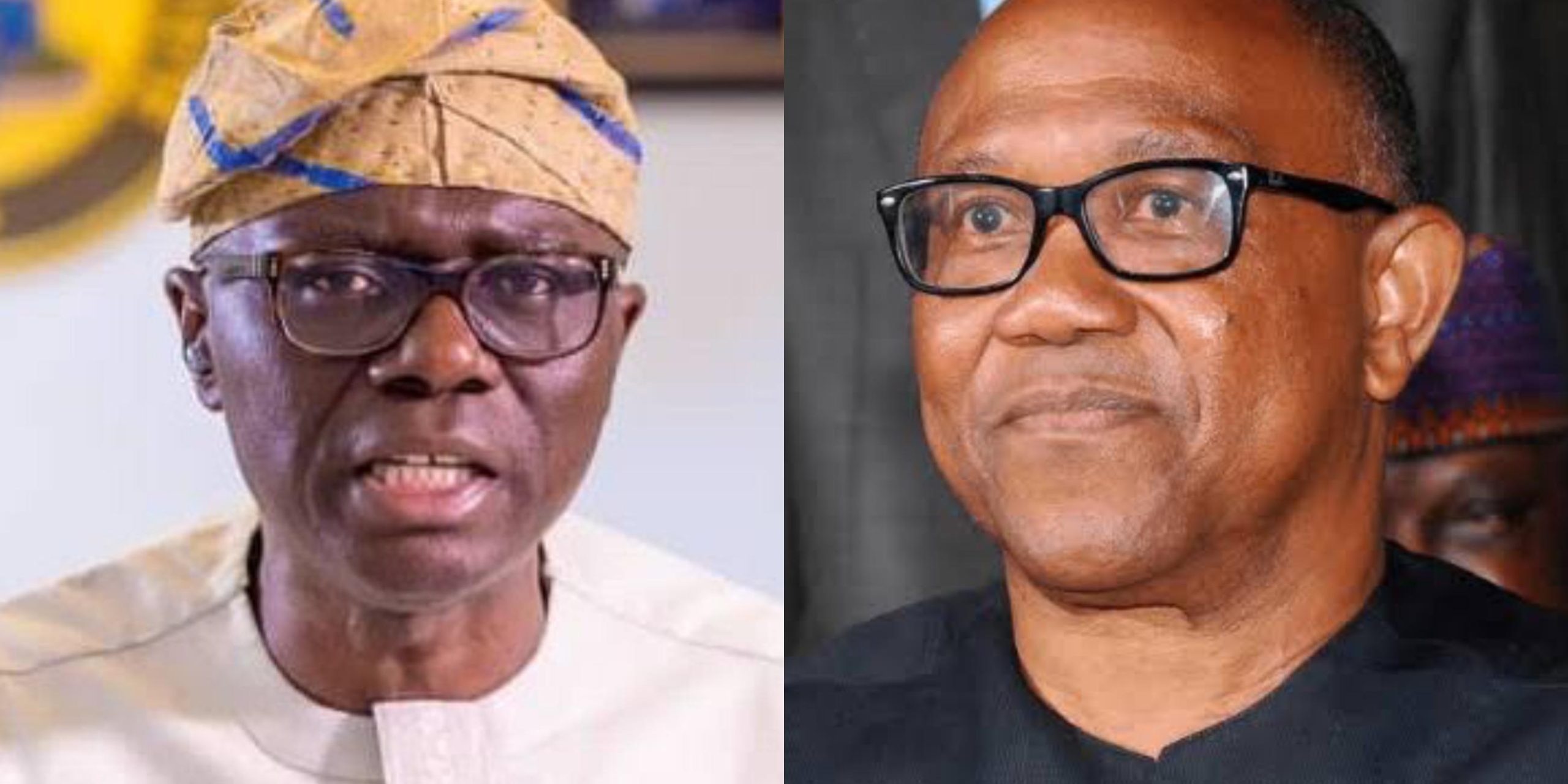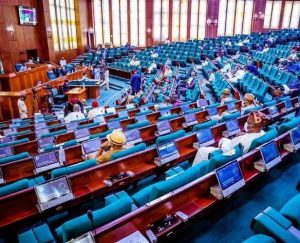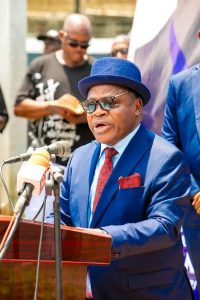Sanwo-Olu Slams Peter Obi Over U.S. University Comments: ‘Poverty Worsened, No School Or Hospital Built In Your 8 Years As Anambra Governor’
In a political clash that has reignited long-standing rivalries between Nigeria’s ruling class and opposition voices, Governor Babajide Sanwo-Olu of Lagos State has lashed out at Labour Party’s presidential candidate in the 2023 election, Mr. Peter Obi, following critical comments Obi made about Nigeria’s poverty situation at Johns Hopkins University, Baltimore, Maryland.
Sanwo-Olu’s strongly worded statement, released on Saturday, accused Obi of lacking the moral standing to lecture on poverty, governance, or development, given what he described as Obi’s “underwhelming legacy” during his eight-year stewardship as Governor of Anambra State.
This controversy touches on several sensitive issues: patriotism, the obligations of political figures abroad, Nigeria’s ongoing battle against poverty, and the contested political legacies of both Peter Obi and Bola Tinubu — Nigeria’s current President and Sanwo-Olu’s political mentor.
During his lecture at Johns Hopkins University on April 24, 2025, Peter Obi reflected on Nigeria’s developmental challenges. In his address, Obi drew comparisons between Nigeria’s poverty levels and those of China and Vietnam, two countries that were, in the 20th century, considered underdeveloped but have since achieved significant economic transformation.
YOU MAY READ
Blocked from Compassion: The Peter Obi–Benue Saga and the Politicisation of Humanitarian Visits
Obi said:
“The question then is, what exactly did these countries do to be able to achieve the desired growth and development? That is where political leadership comes in. These comparable nations, unlike Nigeria, have competent leadership with character, capacity, and compassion — leaders who prioritized investment in education, healthcare, and poverty reduction.”
Obi’s framing of Nigeria’s developmental failures as a leadership problem was not new to Nigerian audiences, but his choice of an international platform to voice these criticisms struck a nerve with the ruling elite back home.
In a statement titled, “Factually Addressing Mr. Peter Obi’s Criticism of Nigeria at Johns Hopkins University,” Sanwo-Olu fiercely defended Nigeria’s image while launching a personal attack on Obi’s credibility.
Sanwo-Olu said:
“He made unflattering remarks not just about the incumbent Nigerian government, but also about Nigeria. I find Mr. Obi’s pattern of behaviour disturbing. When prominent Nigerians go overseas, they ought to project Nigeria positively. That is true patriotism.”
He continued:
“It is ironic that Mr. Obi, who during his eight years as governor did not build a single school or stand-alone hospital, now criticizes a federal government actively investing in those sectors.”
Sanwo-Olu questioned Obi’s moral authority to comment on Nigeria’s poverty, citing figures that, according to him, show poverty in Anambra State worsened during Obi’s administration.
“Before Peter Obi became Anambra Governor on June 14, 2007, the poverty rate in Anambra was 41.4%. After just two years in office, the poverty rate had jumped to 53.7%. It was his successor, Willie Obiano, not Obi, who reduced it significantly.”
Sanwo-Olu’s attack heavily leaned on statistical claims. But it is important to contextualize these figures. The National Bureau of Statistics (NBS) periodically releases poverty data, though methods of measurement can vary over time.
While it is true that poverty remained a persistent issue in Anambra and other southeastern states during Obi’s tenure, critics argue that attributing poverty figures solely to a governor oversimplifies a complex economic environment heavily influenced by federal monetary policies, national inflation rates, and regional security challenges.
YOU MAY READ
May God Help Us As We Aim to Achieve a New Nigeria Where We Do Not Politicize Everything”: Peter Obi Speaks After His Humanitarian Visit to Benue State Was Blocked
Nonetheless, Sanwo-Olu’s framing seeks to present Obi as a hypocrite — someone who failed to alleviate poverty at the state level, now attempting to pontificate on solving it at the national level.
A significant portion of Sanwo-Olu’s statement was devoted to praising President Bola Ahmed Tinubu, linking Tinubu’s leadership in Lagos and now at the national level as a model of poverty alleviation.
According to Sanwo-Olu:
- Tinubu built over 200 schools during his tenure as Lagos State governor.
- Tinubu’s administration provided student loans to over 200,000 undergraduates nationwide in less than two years.
- Tinubu made over half a billion dollars available to SMEs through credit facilities.
Sanwo-Olu insisted that, historically, Tinubu reduced poverty in Lagos by over 46% and argued that Obi’s achievements paled in comparison.
“The best predictor of the future is the past. Tinubu’s record predicts success. Obi’s record predicts failure,” Sanwo-Olu declared.
Sanwo-Olu’s intervention is not just about defending Nigeria’s global image; it is deeply political.
Peter Obi remains one of the most formidable opposition figures in Nigeria today. His Labour Party and grassroots “Obidient” movement continue to exert pressure on the ruling All Progressives Congress (APC). In 2023, Obi’s strong electoral performance, particularly among young, urban voters, stunned traditional political actors.
YOU MAY READ
I Was Even A God Father To Peter Obi When He Was A Governor APC Guber Candidate Boasts On His Capacity To Dislodge Soludo And Capture Anambra State In Nov 8
By challenging Obi’s credibility on an international stage, Sanwo-Olu is attempting to:
- Defend the Tinubu administration’s performance.
- Reframe Obi’s critiques as bitterness or hypocrisy.
- Discourage further international “de-marketing” of Nigeria by opposition figures.
The timing is critical too: as economic pressures mount in Nigeria due to currency fluctuations, subsidy removals, and insecurity, controlling the narrative internationally has become a priority for the government.
Predictably, Obi’s supporters were quick to defend him.
Several pro-Obi groups pointed out that under Obi, Anambra State was rated one of the most fiscally responsible states in Nigeria. He was lauded for maintaining budgetary discipline, building financial reserves, and investing in education reforms — albeit without the construction of flashy new schools or hospitals.
They also argue that Obi left billions of naira in the state’s coffers — an unusual occurrence in Nigerian politics where outgoing governors often leave states indebted.
Obi’s defenders insist that:
- He prioritized quality over quantity in governance.
- Focused on refurbishing existing infrastructure rather than constructing unnecessary projects.
- Empowered mission schools, which historically provided quality education in southeastern Nigeria.
They claim Sanwo-Olu’s attacks are an attempt to distract from Lagos State’s own enduring inequality and poverty pockets, despite being Nigeria’s wealthiest state.
Political analysts note that both sides have points worth considering.
Dr. Chinedu Onuoha, a political economist based in Abuja, said:
“Peter Obi’s criticisms at Johns Hopkins were not out of place. Every serious country allows its citizens to critique leadership. But Sanwo-Olu is also correct to point out that politicians must balance criticism with national reputation management abroad.”
Dr. Onuoha added:
“On Obi’s governance record — he was frugal but perhaps lacked the aggressive infrastructure drive many Nigerians expect. On Sanwo-Olu’s part, Lagos has seen economic growth, but poverty still lurks in its suburbs.”
The consensus among many experts is that Nigeria’s poverty crisis is a multifaceted problem that cannot be blamed entirely on any single leader — state or federal.
A major philosophical question raised by this saga is: What constitutes patriotism for a political figure abroad?
Should politicians “sugar-coat” realities in international forums? Or should they be brutally honest about national failures to catalyze change?
This debate is not unique to Nigeria. Leaders in other struggling countries also face accusations of either embarrassing their nations or enabling poor governance by refusing to speak hard truths abroad.
For Obi’s supporters, his candor is an act of true patriotism: telling hard truths in the hope of reform.
For Sanwo-Olu and his allies, patriotism demands discretion and positive branding, even amid challenges.
Though the 2027 general elections are still two years away, political tensions are already heating up.
Peter Obi has not ruled out another presidential run. His base remains active, especially among Nigerian youths and diaspora communities. Sanwo-Olu, a Tinubu loyalist, is positioning himself as one of the staunchest defenders of the current administration.
The war of words over a lecture in America could be an early skirmish in a much bigger battle for Nigeria’s political future.
Observers believe that controlling international narratives will be crucial in upcoming elections, especially as the Nigerian diaspora’s influence grows through remittances, advocacy, and media platforms.
The Sanwo-Olu vs. Peter Obi confrontation underscores the deep political divisions in Nigeria today. It highlights contrasting visions of leadership, governance accountability, and national pride.
Ultimately, Nigerians will have to decide for themselves whose version of patriotism and governance aligns best with their hopes for a better future: the vision of brutally honest critique represented by Obi, or the call for cautious, protective patriotism embodied by Sanwo-Olu.
As economic hardships persist and global perceptions of Nigeria evolve, the stakes for both the image and the reality of the Nigerian state have never been higher.
For now, both men have laid down their markers. And the debate they have ignited will surely echo through the corridors of power — at home and abroad — in the months and years to come.





